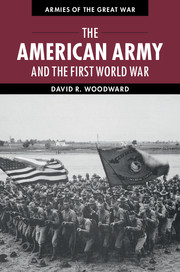Book contents
- Frontmatter
- Dedication
- Contents
- List of figures
- List of maps
- List of tables
- Preface
- List of abbreviations
- Introduction
- 1 Birth of a modern army
- 2 World war and American preparedness
- 3 Coercive power and Wilsonian diplomacy
- 4 “You’re in the army now”
- 5 US army doctrine and industrialized trench warfare
- 6 Over where?
- 7 American Expeditionary Force organization, overseas training, and deployment
- 8 Will the Americans arrive in time?
- 9 Failed expectations: “the military establishment of the United States has fallen down”
- 10 Atlantic ferry
- 11 Neck of the bottle
- 12 Uncertain times
- 13 Cantigny
- 14 Into the breach
- 15 American soldiers in north Russia and Siberia
- 16 The beginning of the end
- 17 Establishment of the American First Army and Saint-Mihiel
- 18 Meuse-Argonne, September 26–October 31
- 19 Breakout, November 1–11
- 20 Epilogue
- Notes
- Bibliography
- Index
2 - World war and American preparedness
Published online by Cambridge University Press: 05 July 2014
- Frontmatter
- Dedication
- Contents
- List of figures
- List of maps
- List of tables
- Preface
- List of abbreviations
- Introduction
- 1 Birth of a modern army
- 2 World war and American preparedness
- 3 Coercive power and Wilsonian diplomacy
- 4 “You’re in the army now”
- 5 US army doctrine and industrialized trench warfare
- 6 Over where?
- 7 American Expeditionary Force organization, overseas training, and deployment
- 8 Will the Americans arrive in time?
- 9 Failed expectations: “the military establishment of the United States has fallen down”
- 10 Atlantic ferry
- 11 Neck of the bottle
- 12 Uncertain times
- 13 Cantigny
- 14 Into the breach
- 15 American soldiers in north Russia and Siberia
- 16 The beginning of the end
- 17 Establishment of the American First Army and Saint-Mihiel
- 18 Meuse-Argonne, September 26–October 31
- 19 Breakout, November 1–11
- 20 Epilogue
- Notes
- Bibliography
- Index
Summary
Shortly before Woodrow Wilson took the oath of office as President, on March 3, 1913, he remarked to a friend that “it would be the irony of fate if my administration had to deal chiefly with foreign affairs.” Wilson had run on a campaign slogan of “New Freedom” by which he meant freedom of opportunity for all Americans and freedom from the domination of the great trusts. Yet his administration was soon to be confronted with the most precarious global situation for the United States since the War of 1812. As Europe moved closer to general war, Colonel Edward M. House, President Wilson’s closest confidant, toured European capitals in May 1914. The report to the President that he filed from Berlin was ominous: “The situation is extraordinary. It is jingoism run stark mad.”
Within weeks House’s prophecy became a reality. On June 28, a young Serb assassin gunned down Archduke Ferdinand, the heir to the Austrian throne, in the streets of Sarajevo, setting off a chain of events that led to general war. The American public generally looked on in horror as conscript European armies, equipped with weapons of unprecedented lethality, clashed. French losses, for example, were double the size of the US Army during the first twelve days of fighting. At the same time, the savage war being waged in Europe strengthened Americans’ belief in American exceptionalism. That European powers in 1914 seemed bent on destroying each other with their mass armies demonstrated to many Americans the superiority of their system and its ideals which included an aversion to large standing armies or resorting to military force to achieve political objectives. The historical record might be at variance with the view that Americans were reluctant to bear arms. But most Americans in 1914 had grown up in a time when wars, especially wars between “civilized” nations, were viewed as anachronistic.
- Type
- Chapter
- Information
- The American Army and the First World War , pp. 17 - 33Publisher: Cambridge University PressPrint publication year: 2014



